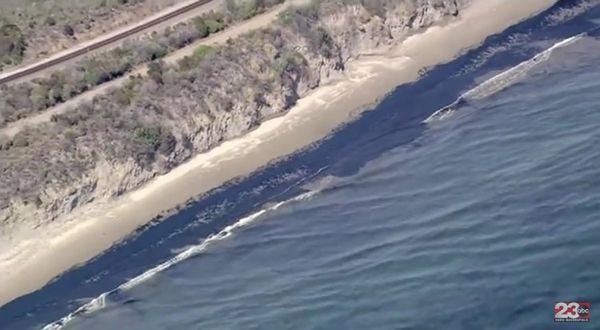Congrats, Santa Barbara! You Got Oiled By One Of America's Slimiest Pipeline Companies!
This post supported by a grant from the Patty Dumpling Endowed Chair for coverage of oil spills, oil industry nastiness, and coastal sliming.
So here's the good news about Tuesday's oil spill in Santa Barbara County, California: It's nothing compared to the 1969 offshore drilling accident that fouled hundreds of square miles of ocean. That one was the third-worst oil spill in U.S. history, while Tuesday's spill was a mere wet fart of a spill, with only about 105,000 gallons of oil spilled, of which a piddling 21,000 gallons went into the coastal waters. (There, that's our "minimizing disaster" tryout for the Heartland Institute blogging job. Wish us luck!)
[contextly_sidebar id="WGaKCdU8V77D0kJ2fhYazxDJ8y2Xa8xb"]
But it was still a doozy, and will take a long time to clean up -- over nine square miles have been fouled, and while by Thursday over 7,700 gallons of oil had been skimmed from the water, there's still a huge gloppy mess at the site of the pipeline break where the spill began sometime Tuesday afternoon:
Some 400 cubic yards of soil-saturated earth around the spill site has already been stored with more expected to be scooped up Thursday.
Pipeline company officials and federal, state and local agencies said cleanup would begin to accelerate as additional workers arrived on scene and pipeline crews received permission to work around the clock.
And here's some cheerful news: the company that operates the pipeline, Plains Pipeline, has a safety record to make Captain Joseph Hazelwood proud, with a whopping 175 safety and maintenance infractions since 2006. The LA Times determined that "Plains' rate of incidents per mile of pipe is more than three times the national average" -- of the 1,700 pipeline operators tracked by the federal Pipeline and Hazardous Materials Safety Administration, only four other companies had more infractions. Still, rounding out the top five is quite an achievement. Maybe they'll offer California a generous settlement, like $6,000 or so .
[contextly_sidebar id="exl0lknyRG5KNO7pqpaiQUmrVN4l0VtL"]
Just how messy is Plains Pipeline? Pretty darn messy:
The company's infractions involved pump failure, equipment malfunction, pipeline corrosion and operator error. None of the incidents resulted in injuries. According to federal records, since 2006 the company's incidents caused more than $23 million in property damage and spilled more than 688,000 gallons of hazardous liquid.
In the last decade, the company has been fined $115,600 by federal regulators, for "violations that include failing to maintain adequate firefighting gear and relying on local volunteer fire departments." In addition, Plains has received other citations for a whole bunch of infractions, like
failing to install equipment to prevent pipe corrosion, failing to prove it had completed repairs recommended by inspectors and failing to keep records showing inspections of "breakout tanks," used to ease pressure surges in pipelines.
The pipeline had actually been inspected two weeks ago, but the results of that inspection had not yet been returned to the company before the leak occurred. The inspection report was also really difficult to read, what with all the crude oil on it.
But the company is right sorry about the spill, it really is. Tuesday, the company issued a statement saying that it feels just awful about all this:
Plains deeply regrets this release has occurred and is making every effort to limit its environmental impact... Our focus remains on ensuring the safety of all involved. No injuries have been reported at this time.
As of Thursday, Plains Pipeline has at least avoided any embarrassing CEO moments -- no top executives saying they wished they had their life back (Oh, hey, that was five years ago!), and no bloated twits dismissing reporters' questions while swigging bottled water , so that's a plus, we suppose.




What? No! No wildlife was harmed. That's just a rare Ebon Pelican!
Sprinkle some arsenic on it, while you're at it. It occurs naturally in almonds!